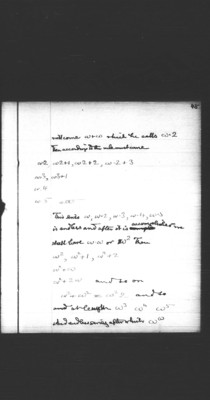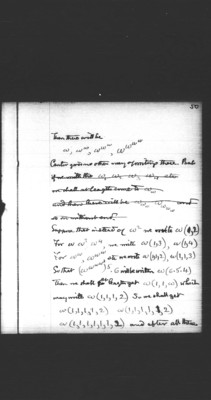Pages
46
44
But there cannot be any compulsion that does not affect any individual, and therefore there is nothing to compel correlates to be non-A's and consequently in some cases none will be non-As. But now if we bring in the assumption that there is no one-to-one relation in which every B stands to an A, this result is rendered impossible, and with it disappears the hypothesis of which it is a necessary consequence; namely, that there is no relation in which no relate has two correlates and in which some B stands to every A. This hypothesis being overthrown it appears then that there is such a relation in which no B stands to two A's yet of which every A is correlate to some B. But we have only to exclude from this all but one of the relations
47
45
of different B's to the same A for every A to reduce its converse to a one-to-one relation of every A to a B. Thus we have proved that if there is no one to one relation of every B to some A there is a one to one relation of every A to some B. [go to p 60]
[skip] Let us now look into another problem. Dr. Georg Cantor has a wonderful system of Ordinal Numbers which I must explain to you. It begins with the ordinary ordinal numbers 1, 2, 3 4 5 6 7 8 9 10 11 ... That series is endless. That is to say, it has no last. But neither in logic nor in fact does that interfere with its being gone completely through provided the objects numbered are not in the nature of existences. When for instance Achilles runs after
48
46
the Tortoise and we choose to divide his course into a first stage in which he goes to the place where the tortoise was at first, a second stage in which he goes to the place where the tortoise was at the end of the first stage, a third stage in which he goes to the place where the tortoise was at the end of the second stage, and so on, the series of stages is endless. But nothing in logic, or in fact, prevents Achilles from accomplishing them all, since they are only possibilities. So then there will be other ordinal numbers, after the first endless series is gone through. And the first of these Cantor denotes by ω then every ordinal number having one next after it, the series runs ω+1, ω+2, ω+3, ω+4, ω+5, and after this endless series is accomplished then
49
48
will come ω+ω which he calls ω·2 Then according to the rule must come ω·2, ω·2+1, ω·2+2, ω·2+3 ω·3, ω·3+1 ω·4 ω·5 etc.
This series ω, ω·2, ω·3, ω·4, ω·5 is endless and after it is accomplished we shall have ω·ω or ω² Then ω², ω²+1, ω²+2 ω²+ω ω²+2ω and so on ω²+ω² = ω²·2 and so at length ω³ ω4 ω5 and endless series, after which ωω
50
50
Then there will be [ω exponents of the exponents] Cantor gives no other way of writing these. But
Suppose that instead of ω² we write ω(1,2). For ω³ ω4, we write ω(1,3), ω(1,4). For ωω, etc. we write ω(1,1,2), ω(1,1,3). So that (ωω…)5·6 will be written ω(6·5·4). Then we shall at length get ω(1,1,ω) which may write ω(1,1,1,2). So we shall get w(1,1,1,1,2) w(1,1,1,1,1,2), w(1,1,1,1,1,1,2) and after all these




